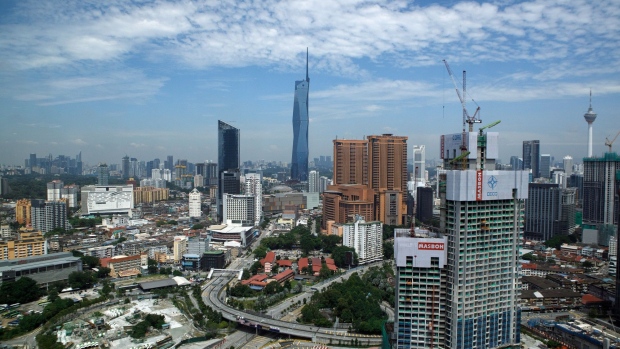Feb 2, 2023
Malaysia’s Fiscal Consolidation Strategy Is Challenging, World Bank Says
, Bloomberg News

(Bloomberg) -- Malaysia should explore new sources of revenue to improve its fiscal position, the World Bank said, adding that its current strategy of achieving fiscal consolidation by reducing spending is challenging.
Raising taxes has “been a matter of urgency for years, because of declining revenue,” Apurva Sanghi, World Bank lead economist for Malaysia, said in a briefing in Kuala Lumpur on Friday.
“How soon should this happen? That’s a political question, but I do believe this government like previous governments are aware of the urgency,” he added.
Malaysia’s revenue level remains low and trails comparative peers, according to the World Bank’s Malaysia Economic Monitor published Friday. Government revenue is expected to resume its declining trend in 2023 on moderating crude oil prices, it added.
The government could consider re-introducing the goods and services tax, or revising the personal income or sales and services taxes, Sanghi suggested. Malaysia continues to under collect in personal and consumption taxes, lagging behind peers, according to the report.
Prime Minister Anwar Ibrahim said Monday his government will work to gradually lower the nation’s debt and narrow the budget gap, without resorting to raising taxes that hurt the poor.
Anwar, who doubles as finance minister, is set to table the revised 2023 budget to parliament on Feb. 24 and has been preaching fiscal prudence as the Southeast Asian nation stares down still-elevated debt levels in the wake of a Covid-era spending drive.
The World Bank said Friday that relying on cutting spending would be tricky as structural expenditure was already elevated, while operating expenditure on supplies and services have been on a declining trend or are already at low levels.
Malaysia, which runs Southeast Asia’s widest fiscal deficit after the Philippines, has seen its budget strained by the cost of keeping essentials at below-market prices. Government subsidies were forecast to reach a record 80 billion ringgit ($19 billion) in 2022, with concessions on fuels and cooking gas alone projected to account for about half the amount.
The World Bank said a move toward targeted subsidies is required, but warned that the shift should be gradual to avoid a sharp increase in inflation. The bank expects Malaysia’s economy will grow 4% in 2023, within the government’s forecast of between 4% to 5%.
(Adds comments by World Bank economist in second, fifth paragraphs)
©2023 Bloomberg L.P.


